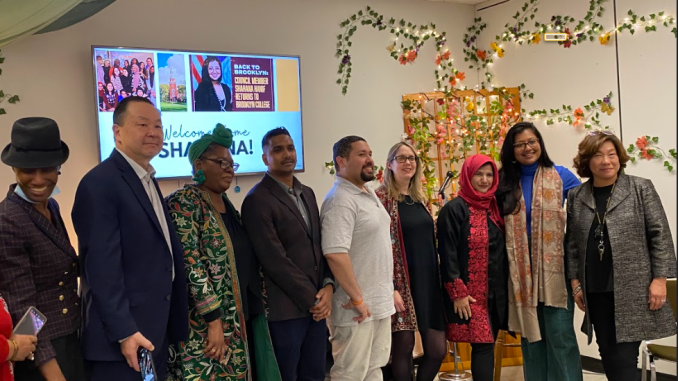
By Gabriela Flores
After being elected as District 39’s council member last November, Shahana Hanif has not forgotten her Brooklyn College roots and the mentors that shaped her into the leader she is today. As a Kensington local with Bangla roots, Hanif is the first Muslim woman to be elected to New York City’s Council. With all the barriers she has overcome, Hanif remains connected to her BC community and returned to The Women’s Center on Friday, Dec. 2.
“Students take this as a space that they can truly call home when they’re on campus,” said Sau-Fong Au, director of The Women’s Center housed in Ingersoll Hall. Being a “school mom” to Hanif and other women in the college community, Au opened the event alongside other BC administrators before turning the floor to the alumna turned councilwoman.
After arriving to BC in 2009, Hanif became an active student leader, becoming involved with organizations like Students for Justice in Palestine, Muslim Students Association, and other causes where she allied with her Puerto Rican and African American studies colleagues. Though her undergraduate career started on the pre-med track, she switched gears to women and gender studies when she recognized the impacts her identifiers as a woman, child of immigrants, and other aspects shaped her experiences.
“This is a campus where my history was taught to me. This is a campus where I learned about the shared struggles of Black, Latinx, South Asian, Asian, and Indigenous communities,” said Hanif. Looking to her mentor Au, and reflecting on her time in The Women’s Center, Hanif recalled the importance of representation. Being the first in many positions, the 31-year-old city council member has remained true to her Muslim, Bangladeshi, and Kensington communities and the people she represents from Park Slope and central Brooklyn neighborhoods.
“You go out to the streets of Brooklyn, New York City, every single day – whether you’re in an Uber, getting Halal from a street vendor, or going to Dunkin Donuts – the visible faces you’re meeting are South Asians. They’re Bangladeshis,” said Hanif. “The people we’re seeing, the density of the communities that make up our homes, don’t reflect who’s legislating on our behalf – who’s making decisions about how the city’s dollars get spent.”
In the midst of all her success, Hanif has battled a bigger challenge: her lupus, a disease she’s been diagnosed with since 17. One of the chief reasons why Hanif chose BC more than a decade ago was because the local B11 bus line took her to Maimonides Medical Center, where she formerly would receive treatment. Today, as she continues navigating through New York City as a woman with a disability, Hanif continues fighting for those who are often not given adequate city resources. Since starting her service as a councilwoman in January, Hanif has passed six pieces of legislation.
After the Supreme Court overturned Roe v. Wade, a landmark decision that ruled abortions as a constitutional right, Hanif went on to ensure that her municipality would have the money and means to support those who needed an abortion. Another significant groundwork that Hanif and her team have committed to well before her election into District 39 has been their long-standing partnership with CUNY Citizenship Now, a free immigration law service. Under the council tenure of Brad Lander, Hanif served as director of organizing and community engagement, where she ensured District 39 worked with local organizations to address local issues.
“CUNY Citizenship Now has been a lifeline to the community in my district. And, of course, they operate everywhere, and they’re CUNY,” Hanif said. “So I wanted to really make sure that the partnerships that the council was joining forces with were local. The talent was from our city, delivering the expertise and specialty services that our immigrant community needed.”
Despite initial language barriers with no attorneys speaking Bangla, the service now has a Bangladeshi attorney. Supporting minorities, immigrant communities, and women has been a practice that’s extended to different scopes of Hanif’s stay as a council representative. According to Hanif, only 5% of NYC’s over $30 billion investment for businesses is granted to minority, women-owned businesses. The low figure is a challenge that Hanif is working to change and tasking BC’s up-and-coming entrepreneurs to address.
“We should be contracting minority, women-owned businesses for city operations,” Hanif explained.
While she continues advocating for those she serves, Hanif will remain connected to Brooklyn College, remembering the mentors and support she’s garnered along her way to becoming a local leader.
“Every day, I’m reading very terrible things about myself,” said Hanif. “So like to have that confidence now to keep doing the work, keep remembering what got me here, to what my principles are, where I’m not gonna compromise, is important.”
